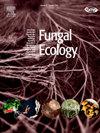在高寒土壤中,由于缺乏合适的菌根共生体,短毛桦的海拔范围扩张可能会减慢
IF 2.2
3区 环境科学与生态学
Q3 ECOLOGY
引用次数: 0
摘要
由于全球变暖,世界范围内树木的高度限制正在增加。然而,专性外生菌根树木(如短毛桦树)的海拔范围扩张可能受到树线以上缺乏真菌共生体的限制,因为这里的植被通常由形成其他菌根类型的植物主导。在模拟高寒和低地温度条件下,采用交叉因子试验方法培养短毛桦幼苗,考察真菌群落是否会限制其成苗。我们发现高山土壤中含有较少的外生菌根真菌,与低地土壤中栽培的幼苗相比,高山土壤中栽培的幼苗体积更小,吸收的外生菌根真菌也更少。我们的研究结果表明,幼苗成功、土壤真菌群落和菌根定植之间存在联系。我们认为,在升高的高山温度下,树线以上的幼苗菌根不成功可能限制了树线的扩张。本文章由计算机程序翻译,如有差异,请以英文原文为准。
Elevational range expansion of Betula pubescens may be slowed by lack of suitable mycorrhizal symbionts in alpine soils
The elevational limit for trees is increasing worldwide due to global warming. The elevational range expansion of obligate ectomycorrhizal trees, such as Betula pubescens, may however be limited by lack of fungal symbionts above the treeline since the vegetation here is often dominated by plants forming other mycorrhizal types. We set up a cross-factorial experiment cultivating Betula pubescens seedlings in alpine and lowland soils, at simulated alpine and lowland temperatures, to test whether the fungal community may limit seedling establishment. We found that alpine soils contained fewer ectomycorrhizal fungi in general and that seedlings cultivated in alpine soil were smaller and recruited fewer ectomycorrhizal fungi compared to seedlings cultivated in lowland soil. Our results indicate a link between seedling success, soil fungal community and mycorrhizal colonization. We suggest that unsuccessful mycorrhization of seedlings above the treeline may be limiting for treeline expansion under increased alpine temperatures.
求助全文
通过发布文献求助,成功后即可免费获取论文全文。
去求助
来源期刊

Fungal Ecology
环境科学-生态学
CiteScore
5.80
自引率
3.40%
发文量
51
审稿时长
3 months
期刊介绍:
Fungal Ecology publishes investigations into all aspects of fungal ecology, including the following (not exclusive): population dynamics; adaptation; evolution; role in ecosystem functioning, nutrient cycling, decomposition, carbon allocation; ecophysiology; intra- and inter-specific mycelial interactions, fungus-plant (pathogens, mycorrhizas, lichens, endophytes), fungus-invertebrate and fungus-microbe interaction; genomics and (evolutionary) genetics; conservation and biodiversity; remote sensing; bioremediation and biodegradation; quantitative and computational aspects - modelling, indicators, complexity, informatics. The usual prerequisites for publication will be originality, clarity, and significance as relevant to a better understanding of the ecology of fungi.
 求助内容:
求助内容: 应助结果提醒方式:
应助结果提醒方式:


